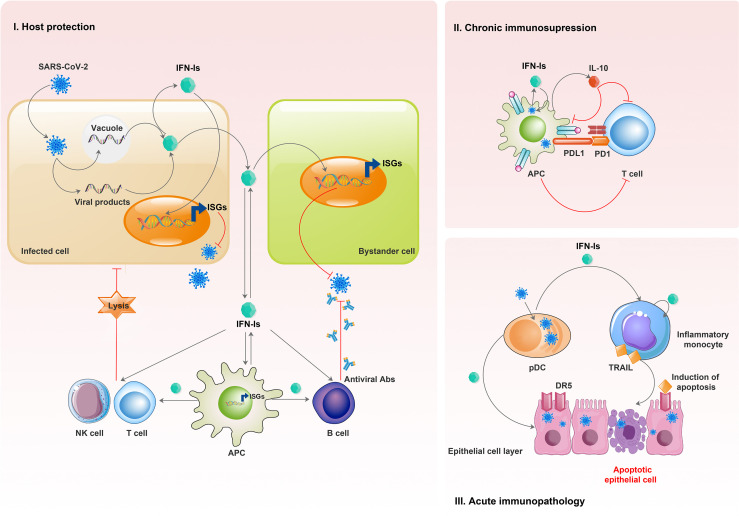Fig. 2b.
IFN-I effects on adaptive immune cells in the viral diseases. I) Viral infection of the vertebrate body cells leads to the production of IFN-Is. Infected and bystander cells are affected by the produced IFNs, inducing ISGs, which leads to the blocking of the viral replication process. Also, these interferons are produced by and affect innate immune cells. IFN-Is enhance the antigen-presenting function of APCs. These interferons strengthen the antiviral function of adaptive immune cells, including B cells, T cells, and natural killer (NK) cells. Viral infection can be restricted by producing antibodies (B cells) and cytotoxic responses (T cells and NK cells) of adaptive immune cells. II) During chronic viral infection, produced IFN-Is can induce the production and release of cytokines such as IL-10, which show immunosuppressive effects. Also, during chronic infection, IFN-Is stimulate the expression of ligands such as PDL1, which recognize T cell-inhibitory receptors (such as PD1 and the PDL1 receptor). These events lead to the suppression of T cell function and persistence of the infection. III) Acute viral infections such as influenza result in the production of IFN-Is by myeloid cells, such as pDCs and inflammatory monocytes. IFN-Is upregulate the death ligand TRAIL expression on inflammatory monocytes and the TRAIL receptor DR5 on epithelial cells. Then, inflammatory monocytes expressing TRAIL lead to immunopathological effects by destroying the epithelial cells. IFN-I, type-I interferon; ISGs, IFN-stimulated genes; APCs, antigen-presenting cells; IL-10, interleukin-10; PD1, programmed cell death protein 1; PDL1, programmed cell death 1 ligand 1; pDCs, plasmacytoid dendritic cells; TRAIL, TNF-related apoptosis-inducing ligand; DR5, death receptor 5.

